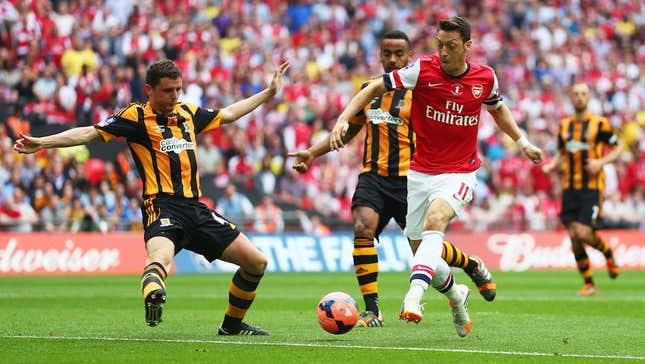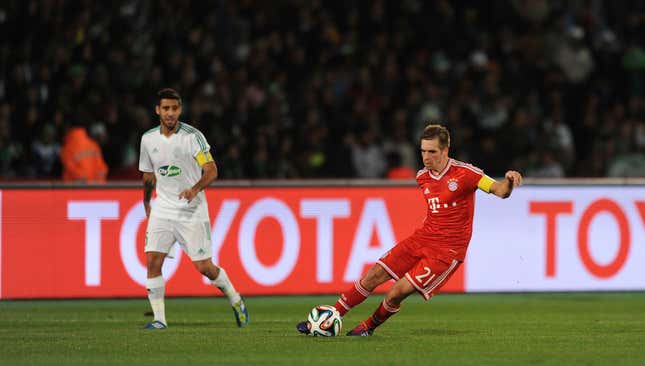
It wasn't too long ago— a few weeks, maybe—that Germany looked a lock to travel down to Brazil and cut a bloody path through the World Cup. Then came the injuries.
The latest and most tragic was the loss of Borussia Dortmund's Marco Reus. In a team full of stone-cold killers, Reus is the best, the scariest. The slight attacking midfielder can play everywhere across the front line, and is a threat to score or create any time he's around the ball. Reus is a devastating talent who occupies the second tier of players below only Lionel Messi and Cristiano Ronaldo. At 25, this World Cup was to be his coming out party as one of the best players alive. And then on June 6, he rolled his ankle in the last German tune-up before the tournament fighting for the ball. When he was examined, it was discovered he'd torn ligaments, and will miss the World Cup.
It was the Reus injury that had onlookers suddenly scratching their heads, looking sideways at the remaining players, wondering if these giants could still limp to a fourth World Cup victory. When healthy, this side looked invincible. The Germans scored 36 goals in UEFA qualifying, more than any other team fighting for World Cup spots. They were undefeated through ten matches; their only blemish was a fluke 4-4 draw against Sweden after leading 4-0 and then, apparently, deciding to leave the pitch early.
But injury after injury has slowly stripped this incredibly stacked team to its bones. In late May, midfielder Lars Bender was ruled out of the tournament when he suffered a thigh injury. Before him, left back Marcel Schmelzer and forward Mario Gomez were cut from the Brazil roster after failing to fight back from injury. Defensive midfielder Sami Khedira has returned just in time from an ACL tear that saw him miss six months of Real Madrid's season, but he's not quite fit. Starting keeper Manuel Neuer, captain Philipp Lahm, and midfielder Bastian Schweinsteiger are all banged up and struggling to return to full strength. This shit is ridiculous.
The cool thing about being incredibly stacked as Germany are, though, is that there are forgotten players on the bench that would start on maybe every other team in the world. Germany boast the deepest midfield in the world, and it's not close. Sprinkled throughout their roster is a heavy FC Bayern contingent—guys who only lose a few games a year—as well as studs from other top domestic clubs like Borussia Dortmund, Real Madrid, Arsenal, and Chelsea. This shit, too, is ridiculous.
It's hard not to squint at this roster awhile and think, Well, they'll be aight. But Die Mannschaft, though still better than almost everyone save one or two teams, are no longer bulletproof. With players healing up, it's reasonable to assume that as nations grow weaker, more fatigued through the World Cup, the Germans will only get stronger as players get healthier.
Germany were drawn into this tournament's Group of Death, along with Portugal, the United States, and Ghana. Their challenge becomes a race, then, a question of whether one or two of these nations can nick this German Kraken before it fully regenerates.
Maybe. Maybe. Still, you probably shouldn't bet on it.
Roster
Goalkeepers: Manuel Neuer (Bayern Munich), Roman Weidenfeller (Borussia Dortmund), Ron-Robert Zieler (Hannover)
Defenders: Per Mertesacker (Arsenal), Philipp Lahm (Bayern Munich), Jerome Boateng (Bayern Munich), Benedikt Hoewedes (Schalke), Erik Durm (Borussia Dortmund), Kevin Großkreutz (Borussia Dortmund), Mats Hummels (Borussia Dortmund), Marcell Jansen (Hamburg), Shkodran Mustafi (Sampdoria)
Midfielders: Mesut Özil (Arsenal), Julian Draxler (Schalke), Matthias Ginter (Freiburg), Bastian Schweinsteiger (Bayern Munich), Mario Götze (Bayern Munich), Toni Kroos (Bayern Munich), Andre Schürrle (Chelsea), Sami Khedira (Real Madrid)
Forwards: Lukas Podolski (Arsenal), Thomas Müller (Bayern Munich), Miroslav Klose (Lazio)
Nickname
Die Mannschaft
FIFA World Ranking
2
Manager
Joachim Löw
Players to Watch
Mesut Özil, Attacking Midfielder

Less than a year ago on this here site, we called Mesut Özil the greatest playmaker in the world upon his arrival to English side Arsenal from Real Madrid. But last season, he languished at times at his new club, and seemed to struggle to adapt to life in the Premier League. This summer, though, he's back at the World Cup where, just four years ago, he burst onto the world scene as The Future.
Arsenal suffered injuries, and don't boast the talent or raw athleticism that Germany have at their disposal. This summer, Özil likely thrive back in with his national team, as he did surrounded by players like Karim Benzema, Cristiano Ronaldo, and Ángel di María in Spain.
Özil is often lauded for being technically perfect, but he's not alone in that. What makes Özil so special is his movement, his genius not on the ball but off it, which causes havoc for opposing defenses. Watch Özil unleash his own special brand of quiet hell during Armenia in Germany's final friendly before the World Cup.
Though Özil can play as any one of the three attacking midfield slots in the 4-2-3-1, and even in as a forward, he's best when he starts at the number 10 position, and then floats throughout the midfield.
He's a ghost, evaporating for minutes at a time before reappearing on the left wing, or on the offside line, or in pockets in front of the opposing defense. By doing this, he can either find soft spots where he can pick up the ball, turn, and then penetrate the defense by running at it or deftly passing through it. Defenders have to pick him up, because he'll kill them otherwise and when he flares out to a sideline or drops in the midfield, gaping holes open up in the center of the pitch which teammates like Thomas Müller, Lukas Podolski, and Mario Götze and others can then run into and exploit.
He creates chances not just with the ball, but without ever touching it, and without Reus available to terrorize back lines, Özil's role in the middle of the park becomes that much more important.
Philipp Lahm, Defender

Philipp Lahm is just the best.
Cristiano Ronaldo and Lionel Messi, both in their prime, will continue to swap the lion's share of plaudits for the foreseeable future. But FC Bayern and Germany captain Lahm may be on par with them both.
The reason the 5-foot-7 right back is so great because he's so reliable. Check out the video below.
If you notice in the video, he's all over the pitch in different positions: at right back, on the left, and most notably, in the middle of the pitch as a holding midfielder.
Lahm in the midfield was an idea brought about by FC Bayern manager Pep Guardiola. Lahm had long been the greatest right back in the world; it was said the defender's a genius, incapable of having a bad game. As a surefooted player, though, Lahm emerged as the greatest holding midfielder in the world, as well—so good, even, that Germany manager Joachim Löw, too, is considering Lahm for a slot in the midfield. This would be a mistake.
Let's not get cute. Portugal, Germany's first and sternest test in the group, have Ronaldo, who is the world's best left winger. Germany have adequate cover in the midfield; where they don't is at right back.
The only way Germany don't get out is if they drop points to Portugal, and they only way Portugal get a result is if Ronaldo runs wild against Germany. If Lahm can shut down the goalscorer, Die Mannschaft should stroll.
Tactics
Forever, it seems, Germany have been a dominant team by being a conservative team. They were conservative to the point of severity, they defended well, guarded their flanks, and dominated on set pieces, long balls, and counters. West Germany won their third World Cup in 1990, and then... nothing.
They needed to reboot, to evolve, and in 2004, they did when rookie manager Jürgen Klinsmann was handed the reigns. In two years, he pulled the Germans into the present, transforming the clunky side into a quick-passing, imaginative one. And today, players that were just coming eight years ago are now grown men. The result, for other nations, at least, is horrifying.
It's hard to argue against Germany as one of the two most talented teams in the world. In their current 4-2-3-1, their defense is anchored by the best keeper in the world, the Clegane brothers in center backs Per Mertesacker and Mats Hummels, and pace on the outside wings. Their midfield is revolving door of geniuses and assassins: Schweinsteiger, Özil, Götze, Kroos, Schürrle, Khedira, Draxler, Müller, Podolski. All these players thrive by playing through opposing defenses for club and country, either creating or finishing short passing games that are designed, like Spain's, to dictate tempo and overpower through possession. This is how Germany play now.
With the injury to Mario Gomez, however, Germany are left with only one out-and-out striker: Miroslav Klose. Klose's a tall, athletic poacher, an aerial threat who also plays off defenders' shoulders, and just this month, became Germany's all-time leading goalscorer. And with 14 career World Cup goals, if Klose gets time in Brazil, he'll likely surpass the Brazilian Ronaldo's all-time best tally of 15.
But Klose's 36. He's not the player he once was, and we don't really know how or if his body will hold up for one last ride. This isn't a huge deal. Teams have won World Cups without traditional center forwards. Germany have Podolski, who can play down the left and acquit himself through the middle, and is probably the single greatest striker of the ball in the world. But they also have Müller, who plays at striker sporadically, and even when out of position, is one of the best at the position.
Even ravaged by injury, Germany still are absolutely loaded, and shouldn't have a problem getting through the Group of Death.
Group G Fixtures
All times Eastern
June 16, noon: Germany vs. Portugal at Arena Fonte Nova
June 21, 3 p.m.: Germany vs. Ghana at Estádio Castelão
June 26, noon: United States vs. Germany at Arena Pernambuco
Screamer is Deadspin's soccer site. We're @ScreamerDS on Twitter. We'll be partnering with our friends at Howler Magazine throughout the World Cup. Follow them on Twitter, @whatahowler.
Top image by Sam Woolley; photos via Getty